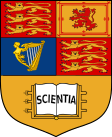Draft:Department of Aeronautics, Imperial College London
 | Draft article not currently submitted for review.
This is a draft Articles for creation (AfC) submission. It is not currently pending review. While there are no deadlines, abandoned drafts may be deleted after six months. To edit the draft click on the "Edit" tab at the top of the window. To be accepted, a draft should:
It is strongly discouraged to write about yourself, your business or employer. If you do so, you must declare it. Where to get help
How to improve a draft
You can also browse Wikipedia:Featured articles and Wikipedia:Good articles to find examples of Wikipedia's best writing on topics similar to your proposed article. Improving your odds of a speedy review To improve your odds of a faster review, tag your draft with relevant WikiProject tags using the button below. This will let reviewers know a new draft has been submitted in their area of interest. For instance, if you wrote about a female astronomer, you would want to add the Biography, Astronomy, and Women scientists tags. Editor resources
Last edited by Shadow614 (talk | contribs) 21 days ago. (Update) |
 The City & Guilds Building from Exhibition Road | |
| Established | 1919 |
|---|---|
Head of Department | Professor Spencer Sherwin |
| Faculty | Imperial College Faculty of Engineering |
| Staff | 25 |
| Students | 748 |
| Location | Exhibition Road, London, United Kingdom |
| Campus | South Kensington |
| Website | www |
The Department of Aeronautics is responsible for teaching and research in aeronautical engineering at Imperial College London, occupying the City & Guilds, Skempton and Roderic Hill buildings at the South Kensington campus. The department has around 35 faculty members, 563 undergraduates, and 178 postgraduate students.
History[edit]
The Department of Aeronautics was founded in 1919.
In 2017, the entire department, except the Honda wind tunnel, was moved into City & Guilds Building from Roderic Hill Building.
Academics[edit]
Study[edit]
Undergraduate[edit]
The undergraduate program at the department is a 4-year integrated course leading to a master's degree in aeronautical engineering, including an option to study a year abroad, or take an extra year in industry. All students graduating with the MEng degree also automatically receive an Associateship of the City and Guilds of London Institute. The MEng course is professionally accredited by Royal Aeronautical Society and Institution of Mechanical Engineers.
Postgraduate[edit]
The department offers three 12-month taught postgraduate programmes leading to a MSc, as well as taking on doctor's students studying for a PhD. All postgraduate students of the department are also eligible for the Diploma of Imperial College, DIC, alongside their standard degree when graduating.
Rankings[edit]
Research[edit]

The department's research is conducted by research groups which have a particular academic focus. These research groups are organized by the department into different divisions which centre around themes of study:
- Net-zero flight technologies
- Sustainable Growth in Space
- Next-generation autonomous systems
- Data-centric aerospace engineering
The department also runs academic centres, some in partnership with industry, including the Brahmal Vasudevan Institute of Sustainable Aviation.
References[edit]
External links[edit]

